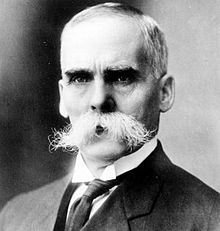Frank Oliver (politician, 1853)
Frank Oliver PC (born September 1, 1853 in Peel County , Canada West, today: Ontario ; † March 31, 1933 ) was a Canadian politician of the Liberal Party of Canada , who was a member of the lower house for 21 years and a minister in the 8th Canadian cabinet of Prime Minister Wilfrid Laurier was. As Minister of the Interior and General Superintendent for Indian Affairs, he was instrumental in Canada's immigration and settlement policy between 1905 and 1911.
Life
Member of Parliament and Federal Minister
Oliver worked as a journalist in Toronto and Winnipeg before settling in Edmonton in 1880 . There he founded the daily Edmonton Bulletin , which he published until 1923.
As a representative of the Liberal Party for Edmonton, he became a member of the 1st Council of the Northwest Territories on May 29, 1883 and was a member of this until 1885. Three years later he became a member of the Legislative Assembly of the Northwest Territories in 1888 and represented Edmonton's interests there until May 23, 1896.
In the elections of 23 June 1896 Oliver was elected as a candidate of the Liberal Party for the first time as a member of the House and represented there first the located in the Northwest Territories Constituency Alberta Provisional District before he followed since the general election on Nov. 3, 1904 until his defeat in the election on December 17, 1917 represented the constituency of Edmonton , which initially belonged to the Northwest Territories and later to Alberta .
He was appointed Minister of the Interior and Superintendent General for Indian Affairs in the 8th Canadian Cabinet by Prime Minister Wilfrid Laurier on April 8, 1905, and held these offices until October 6, 1911.
Immigration Policy between 1905 and 1911

As Home Secretary, he changed the immigration policy of his predecessor Clifford Sifton that had been introduced ten years earlier . While Sifton preferred farmers to factory workers and had made immigration possible for many people of Eastern European origin, Oliver was a staunch advocate of British interests who put nationality before employment in his immigration policy. By the time he took office, a hostile mood was already building up in western Canada towards non-British immigrants. With their completely different manners, languages and customs, many of them could not find their way into British-Canadian norms quickly enough. Nativist groups rose up and called for the preservation and defense of the "Canadian" language, culture and values.
During his tenure, between 1906 and 1910, numerous amendments to the Immigration Act were introduced that enabled naturalization authorities to reject immigration applications for a number of reasons. These included moral inability, the ability to become criminal or financially dependent on the state, and the ability to participate in revolutionary acts. The overall goal of these changes was to significantly increase the number of immigrants of British descent, including the poor and beneficiaries. Immigration from Central and Eastern Europe was drastically limited, whereas colored people, Indians and other immigrants from Asia were practically excluded or subject to considerable poll taxes.
Although Oliver also preferred farmer immigration, many immigrants were trained or unskilled workers during his tenure. With the beginning of the growing railway construction, the demand for workers rose from 1907. With few Canadians or British immigrants tolerating the low wages and poor working conditions in the construction workers' camps, thousands of unskilled workers, many of them from Italy, were allowed to immigrate . In 1910 the demand was so great that the immigration of "foreign laborers" was allowed without restrictions. This policy continued under the 9th Canadian Cabinet of Prime Minister Robert Borden of the Conservative Party of Canada, which came to power in 1911, until the outbreak of World War I in 1914.
In the election of December 6, 1921 , Oliver, who had meanwhile joined the so-called Laurier Liberals , ran for the Liberal Party in the Edmonton West constituency again unsuccessfully for a seat in the House of Commons.
Web links and sources
- Frank Oliver (politician, 1853) - biographical information on the website of the Canadian Parliament (English)
- Canadian Ministries at rulers.org
- Entry on the homepage of the Manitoba Historical Society
| personal data | |
|---|---|
| SURNAME | Oliver, Frank |
| BRIEF DESCRIPTION | Canadian politician (Liberal Party Canada) |
| DATE OF BIRTH | September 1, 1853 |
| PLACE OF BIRTH | Peel County , Canada West, today: Ontario |
| DATE OF DEATH | March 31, 1933 |

